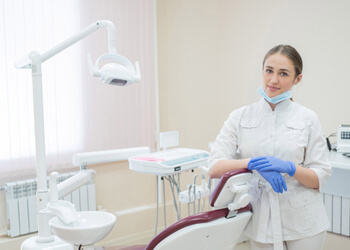How dental air compressors operate
If you’re trying to determine what dental air compressor is right for your practice, it’s helpful to know how a dental air compressor works. An air compressor sucks air from the surrounding environment and compresses it into a storage chamber. There, it can be held for future use, and when needed, the compressed air can be used to power essential pieces of dental equipment.
Dental air compressors also filter the air they take in, removing the moisture and impurities, and lowering the dew point. They do this via an inline filtration system or a filtration system that is built into the dental air compressor. This filtered air is then stored in a sanitary chamber. This is a critical step in the process because the air used to power dental tools must be hygienic.
A brief history of dental air compressors
Dental air compressors have their figurative roots in the human lung: the human lungs were the first bellows to stoke a fire. As human culture developed and more sophisticated bellows were invented; however, the aim is always to take in air, store it, and then expel it at a powerful rate.
Air compressors were introduced in the industrial revolution to help power factory machinery. In the 1900s, air compressors were developed so they could be used for medical purposes.
Today, Cattani compressors offer dentists high-tech solutions to compressed air needs that align with the Dental Board of Australia hygiene guidelines.

The right Cattani compressor for your practice
Finding the right Cattani compressor for your practice comes down to factors such as your practice size and patient flow. Different Cattani compressors are designed for unique practice environments.
All Cattani compressors are oil-free. This means you don’t have to worry about frequent filter changes and the maintenance that goes with an oil-lubricated compressor. Additionally, oil-free compressors are much more likely to produce clean, dry air without the nasty side effect of oil vapour for a pleasant patient experience.
The Cattani AC100
The Cattani AC100 dental air compressor is a quiet, compact single-cylinder model, perfect for practices that service one chair regularly. Additionally, the Cattani AC100Q is a model of the AC100 that features a cover, making for an even more silent air compressor experience. The sophisticated dryer in the compressor helps minimise moisture in the compression tanks, thereby promoting the longevity of your Cattani compressor.
The Cattani AC200
If your practice has grown to two or even three chairs, the two-cylinder Cattani AC200 might be a suitable compressor for your needs. Like the AC100, AC200 offers quiet operation, exceptional air-drying capabilities, and oil-free low maintenance. However, if you’re interested in an even more silent air compressor, consider the AC200Q. Its noise-cancelling hood reduces sound by eight decibels in comparison with the original model.
The Cattani AC300
This three-cylinder model is suitable for practices with three or four chairs. Its efficient dry air storage system gives a reliable source of clean, oil-free airflow. Like the previous three models, there is an even quieter version of the AC300. The AC300Q helps to provide nervous patients who might be intimidated by noisy equipment with a silent air compressor experience. It’s quieter than the original model by five decibels.
Chairs and cylinders
The ratio between chairs and cylinders is important when considering which Cattani compressor is right for your practice. Fortunately, each model lets you choose from a quiet model and an even quieter model with a noise-cancelling hood. Depending on where you store your compressor and how thick the walls of your practice are, you may find that the noise-cancelling hood drastically reduces patient discomfort in and around your treatment rooms.
Final thoughts
Silent air compressors are critical to the comfort and welcoming atmosphere of your practice. They help patients feel more relaxed and make it easier for you to carry on uninterrupted conversations with your clients.
To learn more about the Cattani Compressors available from Cattani Compressors, contact our experienced Cattani Compressors team on (02) 8880 9257 or complete the online contact form.



